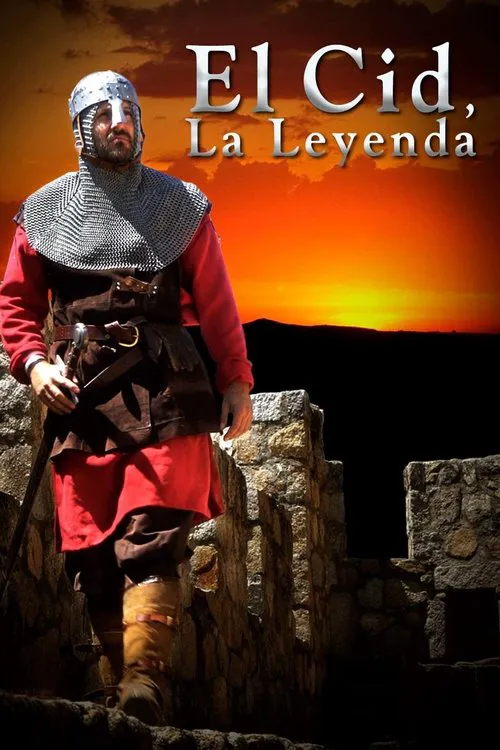El Cid, The Legend

Plot
Rodrigo Díaz de Vivar, known to the world as El Cid Campeador, is an enigmatic figure whose legacy has transcended time and geography. At the heart of his legend lies a complex individual, a man who defied categorization, and whose exploits in the Middle Ages have captivated historians, writers, and artists for centuries. In this documentary, we delve into the multifaceted character of El Cid, exploring the dualities that made him a hero of unparalleled stature. Born in 1043 in Vivar, a small village in Old Castile, Rodrigo was a member of the noble class, but his family's status was far from illustrious. His father, Diego Laínez, was a minor lord who struggled to maintain power against the growing might of the rival kingdoms in the region. This precarious existence would shape Rodrigo's worldview and prepare him for the hardships of his future. As a young man, Rodrigo entered the service of King Sancho II of Castile, who was instrumental in shaping his early military career. Rodrigo's prowess in battle quickly earned him recognition, and he became a trusted lieutenant to the king. His martial skills were forged in the crucible of the Reconquista, a decades-long struggle against the Moorish occupation of the Iberian Peninsula. Rodrigo's involvement in this epic conflict would leave an indelible mark on his life, cementing his reputation as a fearless warrior. However, it was Rodrigo's relationship with the king that would prove to be a defining factor in his life. Sancho II, who often referred to Rodrigo as "my son," saw great potential in his young protégé. He showered Rodrigo with gifts, land, and recognition, effectively promoting him to a position of power. Rodrigo, in turn, proved himself to be an invaluable ally, helping Sancho II expand Castile's dominion over the surrounding territories. Yet, Rodrigo's meteoric rise to prominence would be accompanied by personal costs. His marriage to Jimena Díaz de Manrique, a noblewoman of great beauty and intelligence, was a union that would prove pivotal in his life. While Jimena shared his ambitions and supported his military endeavors, she also provided a stabilizing influence on his tumultuous career. Their love for each other would endure long after Rodrigo's fall from favor with the king. As the years passed, Rodrigo's relationship with Sancho II became increasingly complicated. The king's favoritism and Rodrigo's growing influence made them rivals in the eyes of the court. When Sancho II's brother, Ferdinand I, revolted against him, Rodrigo was forced to choose between his loyalty to the king and his duty to his country. He chose the latter, supporting Ferdinand's rebellion and ultimately contributing to Sancho II's demise. Rodrigo's decision would have far-reaching consequences. Sancho II's death led to a power vacuum in Castile, and Rodrigo's reputation as a troublemaker preceded him. He was forced to flee the kingdom, seeking refuge in the neighboring kingdom of Aragon. There, he would eventually forge an alliance with King Alfonso I, who recognized Rodrigo's military prowess. Rodrigo's subsequent career as a mercenary took him to the distant shores of North Africa, where he fought in several battles against the Moorish armies. His experiences in this unforgiving environment would refine his combat tactics and deepen his understanding of the art of war. Though he never lost a battle, his personal life was marred by difficulties. His son, Diego, died in battle, leaving Rodrigo heartbroken. The loss would be a recurring theme in his life, echoing the harsh realities of a world where war and mortality haunted every turn. Despite these hardships, El Cid's legend continued to grow. He became a hero of the Reconquista, his name synonymous with valor and chivalry. When he received a royal pardon from King Alfonso VI of Castile, he returned to his native land, where he would lead the Christian forces to victory against the Moors. The Battle of Valencia, fought in 1094, would be a defining moment in his life, cementing his status as a military genius. El Cid's final victory at Valencia would, however, be followed by personal tragedy. Upon his death in 1099, his city of Valencia was left without a leader, and his widow, Jimena, was forced to govern the kingdom in the absence of her husband. The Cid's legacy would transcend his own lifetime, inspiring generations to come. As a historical figure, El Cid remains shrouded in mystery. Some see him as a heroic figure, embodying the very essence of chivalry and martial prowess. Others view him as a ruthless mercenary, willing to serve any master who would grant him power and recognition. His true character, however, remains elusive, a testament to the complexities that have captivated the imagination of artists, historians, and writers for centuries. In this sense, El Cid's legend serves as a reminder that history is often shrouded in myth, and that the most enduring figures are those who transcend the boundaries of truth and fiction. His story, a tapestry of triumphs and setbacks, has captivated audiences across the ages, inspiring new interpretations and perspectives on this enduring figure.
Reviews
Recommendations



